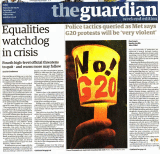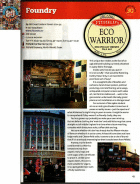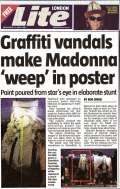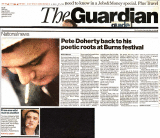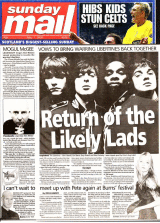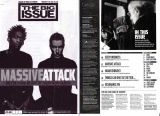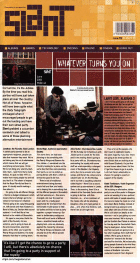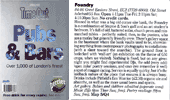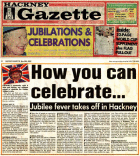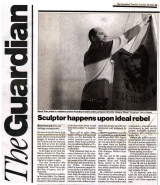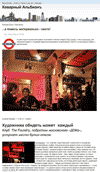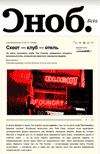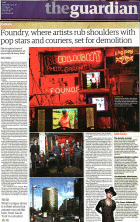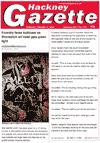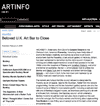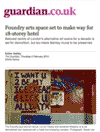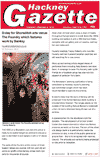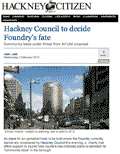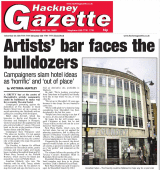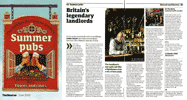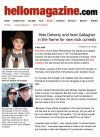[press - foundry]
[<<<] [>>>] click on image to enlarge
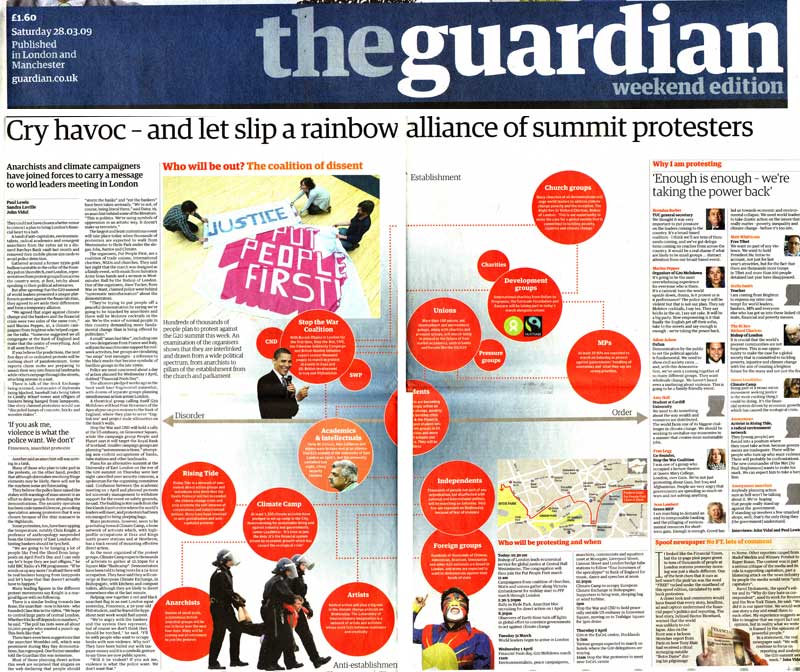
© tracey moberly 20090328.Guardian_5.jpg
The Guardian
The Foundry
Cry havoc -and let slip a rainbow alliance of sununit protesters
Anarchists and climate campaigners have joined forces to carry a message to world leaders meeting in London
28 March 2009
They could not have chosen a better venue to concoct a plan to bring London's financial heart to a halt.
A band of anti-capitalists, environmentalists, radical academics and resurgent anarchists from the 1980s sat in a disused Barclays Bank vault last month and removed their mobile phone sim cards to avoid police detection.
Gathered around a former 1930s gold bullion turntable in the cellar of the Foundry pub in Shoreditch, east London, representatives from protest groups from across the country were, at first, tetchy about speaking to their political adversaries.
But after agreeing that the G20 summit of world leaders presented a unique platform to protest against the financial crisis, they agreed to set aside their differences and form a temporary alliance.
"We agreed that anger against climate change and the bankers and the financial crisis were two sides of the same coin," said Marina Pepper, 41, a climate campaigner from Brighton who helped organise the talks. "Someone suggested we all congregate at the Bank of England and make that the centre of everything. And it all went from there."
If you believe the predictions, the next five days of co-ordinated protests will be nothing short of pandemonium. Some reports claim mobs are preparing to smash their way into financial landmarks while others rampage through the streets, attacking anyone in a suit.
There is talk of the Stock Exchange being stormed, motorcades of diplomats being blocked, baseball bats being taken to Canary Wharf tower and effigies of bankers being hanged from lampposts. One story claimed protesters would use "discarded lumps of concrete, bricks and wooden stakes".
Another said an anarchist cell was arriving in a tank.
Many of those who plan to take part in the protests, on the other hand, predict that although skirmishes involving fringe elements may be likely, there will not be the mayhem some are forecasting.
They believe the police have raised the stakes with warnings of mass unrest in an effort to deter people from attending the demonstrations. The security operation has been code named Glencoe, provoking speculation among protesters that it was chosen because of the 1692 massacre in the Highlands.
Some protesters, too, have been upping the temperature, notably Chris Knight, a professor of anthropology suspended from the University of East London after hinting bankers should be lynched.
"We are going to be hanging a lot of people like Fred the Shred from lampposts on April Fool's Day and ] can only say let's hope they are just effigies,." he told BBC Radio 4's PM programme. "If he winds us up any more I'm afraid there will be real bankers hanging from lampposts and let's hope that that doesn't actually have to happen."
Many leading figures in the different protest movements say Knight is a marginal figure with no following.
There is a similar feeling towards Ian Bone,the anarchist - now in his 60S - who founded Class War in the 1980s. "We hope to control large parts of central London. Whether it kicks off depends on numbers," he said. "The poll tax riots were all about 50,000 people who wanted a punch-up. This feels like that."
There have even been suggestions that the anarchist Wombles cell, which was prominent during May Day demonstrations, has regrouped. One former member told the Guardian this was nonsense. Most of those planning direct action this week are surprised that slogans on the web declaring that people should "storm the banks" and "eat the bankers" have been taken seriously. "We're not, of course, being literal there," said Daisy, 19, an anarchist behind some of the literature. "This is politics. We're using symbols of oppression in an artistic way. It doesn't make us terrorists."
The largest and least contentious event will take place today when thousands of protesters are expected to walk from Westminster to Hyde Park under the slogan Jobs, Justice and Climate.
The organisers, Put People First, are a coalition of trade unions, international charities, NGOs and churches. They said last night that the march was designed as a family event, with music from Salvation Army brass bands and a sermon in Westminster Hall by the Bishop of London. One of the organisers, Dave Tucker, from War on Want, claimed police were behind "systematic misinformation" about the demonstrators.
"They're trying to put people off a peaceful demonstration by saying we're going to be hijacked by anarchists and there will be Molotov cocktails in the air. We're the voice of normal people in this country demanding more fundamental change than is being offered by politicians. "
A small "anarchist bloc", including one or two delegations from France and Italy, will join the march to raise support for midweek activities, but groups are circulating "no ninja" text messages - a reference to the black masks that became symbolic of hardline groups in the late 1990s.
Police are most concerned about a day of action planned for Wednesday 1 April, dubbed "Financial Fools Day".
The alliances pledged weeks ago in the bank vault have fragmented somewhat, with dozens of separate groups planning simultaneous action across London.
A theatrical group calling itself G20 Meltdown will lead Four Horsemen of the Apocalypse on processions to the Bank of England, where they plan to serve "English tea" and project nude silhouettes on the Bank's walls.
Stop the War and CND will hold a rally at the US embassy, on Grosvenor Square, while the campaign group People and Planet says it will target the Royal Bank of Scotland. Smaller campaign groups are planning "autonomous actions," attempting non-violent occupations of banks, tube stations and other landmarks. Plans for an alternative summit at the University of East London on the eve of the G20 summit on Thursday were last night cancelled over security concerns, a spokesman for the organising committee said. Confusion between the academic meeting on 1 April and planned protests led university management to withdraw support for the event on safety grounds, he said. The building is 800 yards from the Docklands Excel centre where the world's leaders will meet, and protesters had been encouraged to bring sleeping bags. Many protesters, however, seem to be gravitating toward Climate Camp, a loose network of activists which, with high profile occupations at Drax and Kings north power stations and at Heathrow, has a track record of mounting effective direct action.
As the most organised of the protest groups, Climate Camp expects thousands of activists to gather at 12.30pm for a Square Mile "flashcamp". Demonstrators have been told to bring tents for a24-hour occupation. They have said they will converge at European Climate Exchange, in Bishopsgate, with kitchens and compost toilets, although they are likely to divert somewhere else at the last minute.
Helping sew together a red and black anarchist flag in an east London squat yesterday, Francesco, a 30-year-old PhD student, said he feared the hype about next week would fuel unrest.
"We're angry with the bankers and the system they represent, but of course we don't think they should be torched," he said. "I'll be with people who want to occupy banks with non-violence. Why not? They have been bailed out with taxpayer money and it is a symbolic gesture to say these are now public spaces. "Will it be violent? If you ask me, violence is what the police want. We don't want that."
